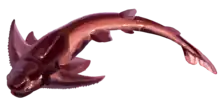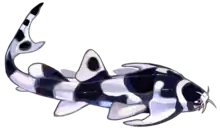| Compagopiscis Temporal range: Late Devonian: Frasnian, | |
|---|---|
| Scientific classification | |
| Domain: | Eukaryota |
| Kingdom: | Animalia |
| Phylum: | Chordata |
| Class: | †Placodermi |
| Order: | †Arthrodira |
| Suborder: | †Brachythoraci |
| Clade: | †Eubrachythoraci |
| Clade: | †Coccosteomorphi |
| Superfamily: | †Incisoscutoidea |
| Genus: | †Compagopiscis Gardiner & Miles, 1994 |
| Species | |
| |
Compagopiscis is an extinct genus of placoderm known from the Gogo Formation. It lived in the Upper Devonian (Frasnian stage) of Western Australia.[1] The genus is monotypic, with its only species being Compagopiscis croucheri.[2]
Description
Compagopiscis is one of the earliest known vertebrates to have teeth.[3] An analysis of its bite force suggests that it was a generalist predator, having a diverse diet.[4] Fossils have been found in numbers, suggesting possible schooling behavior.[4]
Phylogeny
Compagopiscis was originally classified as a member of the family Plourdosteidae.[5] However, phylogenetic analysis later found Plourdosteidae to be an invalid grouping, and the family was dismissed.[6] Torosteus is now considered to be a member of the superfamily Incisoscutoidea, which belongs to the clade Coccosteomorphi, one of the two major clades within Eubrachythoraci. The cladogram below shows the phylogeny of Compagopiscis:[7]
| Eubrachythoraci |
| ||||||||||||||||||||||||||||||||||||||||||||||||||||||||||||||||||||||||||||||||||||||||||||||||||||||||||||||||||
References
- ↑ Donoghue, Philip C. J.; Rücklin, Martin (2014-09-15). "The ins and outs of the evolutionary origin of teeth". Evolution & Development. 18 (1): 19–30. doi:10.1111/ede.12099. ISSN 1520-541X. PMID 25219878.
- ↑ Trinajstic, Kate (1995-01-01). "The role of heterochrony in theevolution of eubrachythoracid arthrodires with special reference to Compagopiscis croucheri and Incisoscutum ritchei from the Late Devonian Gogo Formation, Western Australia". Geobios. Premiers Vertandébrandés et Vertandébrandés Infandérieurs. 28: 125–128. doi:10.1016/S0016-6995(95)80099-9. ISSN 0016-6995.
- ↑ Rücklin, Martin; Donoghue, Philip C. J.; Johanson, Zerina; Trinajstic, Kate; Marone, Federica; Stampanoni, Marco (2012). "Development of teeth and jaws in the earliest jawed vertebrates". Nature. 491 (7426): 748–751. doi:10.1038/nature11555. ISSN 1476-4687. PMID 23075852. S2CID 4302415.
- 1 2 Trinajstic, Kate; Briggs, Derek E. G.; Long, John A. (23 November 2021). "The Gogo Formation Lagerstätte: a view of Australia's first great barrier reef". Journal of the Geological Society. 179 (1). doi:10.1144/jgs2021-105. ISSN 0016-7649.
- ↑ Carr, R.K.; Hlavin, W.J. (2010). "Two new species of Dunkleosteus Lehman, 1956, from the Ohio Shale Formation (USA, Famennian) and the Kettle Point Formation (Canada, Upper Devonian), and a cladistic analysis of the Eubrachythoraci (Placodermi, Arthrodira)". Zoological Journal of the Linnean Society. 159 (1): 195–222. doi:10.1111/j.1096-3642.2009.00578.x.
- ↑ You-An Zhu; Min Zhu (2013). "A redescription of Kiangyousteus yohii (Arthrodira: Eubrachythoraci) from the Middle Devonian of China, with remarks on the systematics of the Eubrachythoraci". Zoological Journal of the Linnean Society. 169 (4): 798–819. doi:10.1111/zoj12089.
- ↑ Zhu, You-An; Zhu, Min; Wang, Jun-Qing (1 April 2016). "Redescription of Yinostius major (Arthrodira: Heterostiidae) from the Lower Devonian of China, and the interrelationships of Brachythoraci". Zoological Journal of the Linnean Society. 176 (4): 806–834. doi:10.1111/zoj.12356. ISSN 0024-4082.







